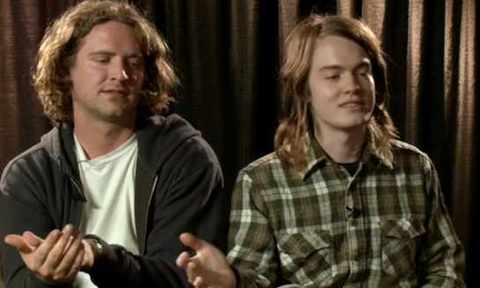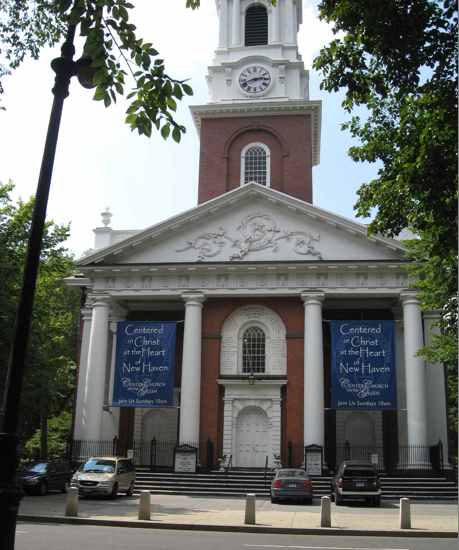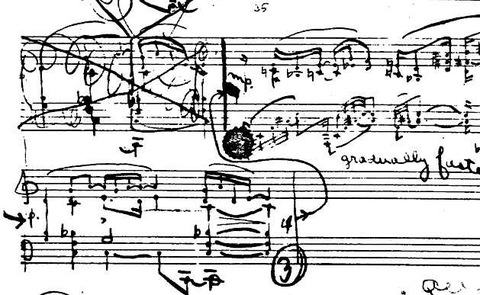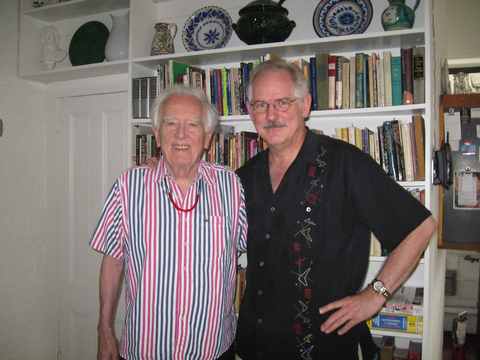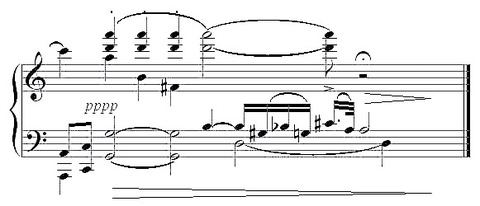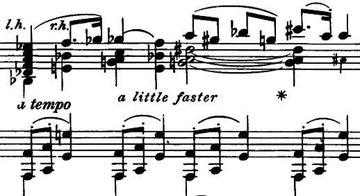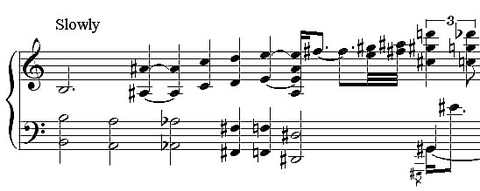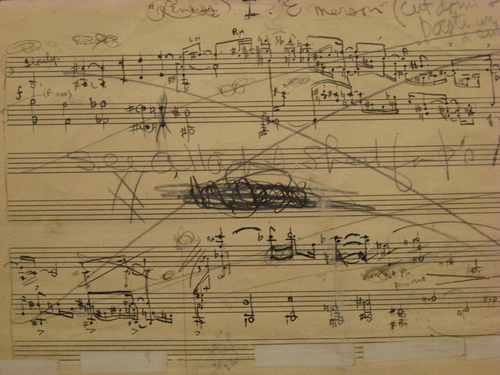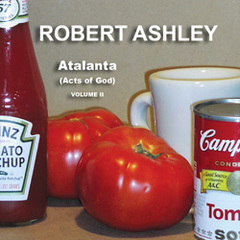You can’t hear my son Bernard say anything in this Revolver magazine interview with his black metal band Liturgy, but you can watch him look cool. He claims the things he said got edited out, but he’s kind of a quiet guy. Didn’t get it from me. I’m shy around people I don’t know, but I tend to blossom when you stick a microphone in my face.
Have I Written String Quartets?
I finished another string quartet today – or at least, a piece for string quartet. See, I was asked to write a string quartet, and my original idea was to write one in three movements. I’m not much of a three-movement kind of guy, though, and the idea I had for the first movement got too long and too formally all-encompassing to be a movement. So it grew into an imposing, probably too-long, 25-minute movement, called The Light Summer Land. To title it just String Quartet seemed misleading. But I still had these ideas for the other movements, so I went ahead and wrote the third one anyway. It’s a four-part canon at the major sixth, 13 minutes long, called Hudson Spiral – a companion piece to my nine-part triple canon Chicago Spiral, which I wrote in Chicago, and now I live in the Hudson Valley. I’ll probably finish the second movement as well, and that’ll be another independent piece. I don’t think they can all fit in the same, wrist-slittingly long piece, being based on unrelated ideas.Â
Tracking a Former Student
Yesterday James Sinclair – emperor of all things Ivesian, who heroically catalogued all 8000 pages of Charles Ives’s manuscripts – took me on the Ives walking tour of Yale. While a student there Ives lived in Connecticut Hall, then as now the oldest building left on campus, which, because of its age, tended to house the less affluent students. His dorm room was on the second floor, the last two windows on the right:
Rewards of Musicology
In Ann Arbor I took photos of the houses Robert Ashley grew up in. (Old phone books in libraries, I’ve discovered, are a cheap way to chart history.) I showed him this house on Brookwood where he lived as a teenager -Â
Second-Guessing Chuck
NEW HAVEN – I played the last two movements of the Concord Sonata in high school, and the final four articulated notes of “Thoreau” – G# Bb G C# – have always bothered me. I remember arguing with my piano teacher about them. They don’t seem to have much motivic resonance with the rest of the movement, and the final ambiguous tritone always struck me as un-Ivesian. So now I’m at Yale library looking through the Ives archive, and I’m finding that Ives’s original manuscript presented a different picture. The original ending, which was followed in the 1920 edition but was dropped for the Arrow Press Edition, followed that C# with a dotted-rhythmed A:
Book vs. Music
They noted that there were certain things which were impermanent and other things to which the word impermanence did not apply. – Perfect Lives
I spent June composing and July writing a book. Both are enjoyable and self-fulfilling activities; I am fortunate. The first feels like I’m taking care of myself and developing psychically, putting myself first; the second feels like I’m adding to my authority and piling up ammunition for future writing and debate. It saddens me that the book feels like so much more solid an achievement. The music might never get played, it might get played badly, there might not be a recording, people might not like it or not get it, it may disappear into the ether. The book, being from an academic press, will go into 500 libraries automatically and sit there on the shelves waiting to be tripped over. It will be used by other researchers and quoted in other books. Every time I open the book, it will read just as eloquently as the first time; the music, I’ll have to worry again about every new performance, whether it will go well and sound good. Physically, the result of my composing will mainly be a PDF out on the internet. If I’m lucky and find some money, a compact disc may result, which feels a little bit like a book, but doesn’t get distributed as well. CDs seem to disappear, whereas when I go to friends’ houses, I notice my books sitting on their shelves. Books impress my employers, which my un-prize-winning music doesn’t, and the books bring me lecture gigs, which my music rarely does. (Economically, oddly enough, they’re about the same: I’ve made more money from music commissions than book advances, but the quarterly drip of book royalties offsets that.) After Music Downtown I thought I might not write any more books and just focus on my music from now on, which sounded great. I could do that. But I got seduced back into books as a much easier path toward the appearance of achievement. I could have written all my music and still not be taken seriously by a wide variety of people, but the books (peer-reviewed, published at someone’s expense, permanent, not misunderstandable) give me a kind of irrefutable clout that I can’t deny enjoying. And now I have three more books I’m thinking of working on down the road.
Music is a History of Our Struggle with the Law
This unparaphraseable self-dialogue from Atalanta illustrates something of what I love so much about Robert Ashley’s music:
I said, “Is the struggle with the law manifested in every
aspect of the making of music, or are there law-abiding aspects and others that
are confrontational only because of indiscretion on the musician’s part –
because of a transgression?”
He said to me, “Music is the enactment of the manifestation
of the struggle with the law on a scale of continuous attempts; that is, where
the attempts are related to each other symbolically through a pattern imposed
on our memory. Music is a history of our struggle with the law.”
I said, “Can music, then, substitute itself for the
enactment of the struggle in other parts of our lives?”
He said to me, “That is its most common use.”
I said, “The musician, then, becomes socially symbolic,
enacting restlessness.”
He said to me, “Yes. In order to be law-abiding, there has
to be a place where one can rest. One can be law-abiding only in safety from
the law.”
I said, “Is the listener different from the musician?”
He said to me, “Yes, that is the paradox of music. In
listening to music we are observing other persons like ourselves, but the
consequences of their actions do not accrue to us actually. Their actions are
understood only in retrospect. The consequences may accrue to us as wisdom. May
even endanger our relationship to the law, may change our minds, but for the
listener the act has already come into existence before the law is recognized.
The listener is in safety from the law.”
UPDATE: Notice how subtly and beautifully it nuances the tone that he uses “He said to me” rather than simply, “He said.” The man’s a frickin’ poet.
Offended by Expertise
In an interview on Slate, Wikipedia cofounder Larry Sanger (who left the organization) confirms the very reasons I quit having anything to do with the web site:
Q. Why did you feel so strongly about involving experts?
A. Because of the complete disregard for expert opinion among a group of amateurs working on a subject, and in particular because of their tendency to openly express contempt for experts. There was this attitude that experts should be disqualified [from participating] by the very fact that they had published on the subject–that because they had published, they were therefore biased. That frustrated me very much, to see that happening over and over again: experts essentially being driven away by people who didn’t have any respect for those who make it their
lives’ work to know things.
Q. Where do you think that contempt for expertise comes from? It’s seems odd to be committed to a project that’s all about sharing knowledge, yet dismiss those who’ve worked
so hard to acquire it.
A. There’s a whole worldview that’s shared by many programmers–although not all of them, of course–and by many young intellectuals that I characterize as “epistemic egalitarianism.” They’re greatly offended by the idea that anyone might be regarded as more reliable on a given topic than everyone else….
And later, just as accurately:
This is a general problem with Wikipedia: What is praised as consensus decision-making or crowd-sourcing often just means that the person with the loudest voice or the most time on his or her hands is the one who’s going to win.
Center of the Universe
We live eight miles from where Chelsea Clinton is getting married this weekend. I walked into my local copy shop, and Jerry asked, “Have you gotten your invitation to the big wedding yet?” I said, “Mine must have gotten stuck in the mail, it hasn’t arrived.” Jerry said, “Yeah, it’s probably sitting next to mine.” No boats are allowed to sail in this stretch of the Hudson for the weekend. The biplanes at the Aerodrome, a popular local attraction, are grounded for the duration. The fairgrounds have been emptied out, because that’s where the helicopters are landing. Two extra sheriffs have been hired, apparently at taxpayer expense. The Clintons are staying with a rich family whose name adorns one of Bard’s most expensive buildings. Residents are pretty much warned to stay away from the town this weekend. The rehearsal dinner is rumored to be taking place at my favorite local restaurant, a joint too pricey for me to dine at except on celebratory occasions. If by any chance Chelsea is a reader of this blog, I highly recommend the macadamia-nut tempura calamari and the garlic soup. They’re fantastic. And mazel tov.
Ashley in the Rear-View Mirror
Robert Ashley’s 1983 opera Atalanta is actually three operas: one about the painter Max Ernst (uncle of Bob’s wife), one about the jazz pianist Bud Powell, and one about Bob’s uncle Willard Reynolds, the family story-teller and, as Bob calls him, shaman. Any given performance is made up of one act about each hero, and the acts are interchangeable, so one performance will contain one set of stories and the next night a different set of stories. As Bob writes in his “Future of Music” lecture,Â
At the opera I am transported to a place and time
where there is no disorder. There is disorder on stage, and it is called
melodrama. We don’t believe it. This is important: that we don’t believe it. We
do believe… what happens in the movies…. Therefore, opera can have no plot. It
is foolish to argue that opera – any opera – can have a plot; that is, that the
“characters” and their apparent “actions” and the apparent “consequences” are
related in any way. Opera can be story-telling only. That the story-telling
happens on stage and that musicians are making music in the pit (to reinforce
the story told) is entirely coincidental. The story might as well be told at
the kitchen table with a crazy aunt and uncle as the soprano and tenor.
1. Homo agens: man acting, or in conflict (Allegro)
2. Homo sapiens: man thinking (Adagio)
3. Homo ludens: man playing (Scherzo), andÂ
4. Homo communis: man in the community (Allegro)
Homo agens: Improvement: Don Leaves Linda -Â Linda in conflict and acting to ensure her own safety
Homo
sapiens: eL/Aficionado,
the Agent looking back and trying to reconcile his experiences
Homo
ludens: Foreign Experiences, Don Jr. having wild rides with an Indian guide in his imagination
Homo
communis: Now Eleanor’s Idea, Now Eleanor finding her destiny within the Lowrider community
Â
It’s kind of an amazing five-and-a-half-hour operatic symphony. (I also have to wonder why I spend so much time on really, really long pieces, when I don’t write very long pieces myself.)

